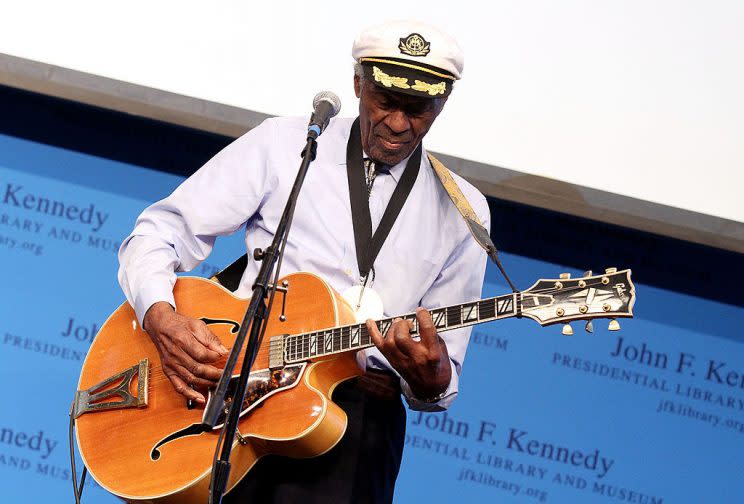Chuck Berry's Son Talks Legacy, Family, and the Making of His Dad's Last Album

Three months after the death of his father, Chuck Berry—who passed away on March 18 at 90— Charles Berry Jr. has put into perspective the immortality of the rock and roll pioneer. “It’s much like Beethoven, much like Tchaikovsky. He’s in that category,” says Berry, 55. “Three hundred years from now, his music is gonna be right up there with all the other greats.”
But the late singer-guitarist behind classics like “Maybellene,” “Roll Over Beethoven,” and, of course, “Johnny B. Goode” adds another chapter to his legendary songbook with today’s posthumous release of Chuck, his final studio album and first since 1979. The self-produced LP — which was announced on Berry’s 90th birthday last October 18 — features musical support throughout from both his only son, Charles Jr. (on rhythm guitar), and his daughter Ingrid Berry-Clay (harmonica, vocals) as part of his Blueberry Hill backing band.
With Berry’s two children playing such key roles in the recording of Chuck, it made the project a loving family affair. “My sister Ingrid has been on several of my dad’s albums — she’s been a band member since the early ’70s. This was my first studio appearance on anybody’s record,” says Charles Jr., who joined his father’s band in 2001 and played with him until he stopped performing in October 2014. “So it was special for us. It’s something my dad really wanted — to have his children on his record.”
As for why it took Berry 38 years to release another studio album, his son explains, “He started working on it right after the release of Rock It in 1979 and managed to get a pretty good amount of material built up. But in 1989 there was a devastating fire at his recording studio, so all that work was destroyed. After rebuilding his studio, he had to start from scratch around 1991. So [it was] that in combination with my dad still being a touring entertainer and having other business ventures.”
As a result, the Berry who started Chuck was significantly younger than the Berry who finished it. “What you are hearing is a much older creative mind,” says Charles Jr. “Even in 1979, my dad was 52-53 years old, so that’s a big difference between [making] ‘Sweet Little Sixteen’ when he’s 20-something. You can tell that you were dealing with an artist that was maturing creatively. It’s just that maturity and wisdom that time gives a person.”
Those qualities can be heard on the moving ballad “Darlin’,” on which a father sings to his daughter about mortality. Fittingly, the song is a duet between Berry and his own daughter Ingrid. “My dad had three daughters, but my sister Ingrid’s first name is Darlin, so it could very easily be specifically about her,” says Charles Jr. “Ingrid did a wonderful job on that particular number. She came in and did her vocals in early January of this year, and she knocked it out of the park.”
Another Chuck track, the Caribbean-accented “Jamaica Moon,” reworks Berry’s 1957 tune “Havana Moon,” while the rip-roaring “Lady B. Goode” plays like a sequel to his signature 1958 hit “Johnny B. Goode.”
“It’s a complement to that song; it’s the woman’s perspective on that whole story,” says Charles Jr. “I think it works really well. My dad had always talked about doing a follow-up to ‘Johnny B. Goode.’”
“Lady B. Goode” has the “bonus prize” of also featuring Charles Jr.’s 23-year-old son, Charles III, on guitar. The three generations of Berry men also crank up their guitars on the album opener “Wonderful Woman.” “My son became an unofficial [Blueberry Hill] band member when he sat in with us at one of my father’s concerts here in St. Louis, and he played the whole show with us,” says Charles Jr. “In fact, there were a couple of pictures of the three of us from that show that made it into Rolling Stone magazine. That was a proud moment for my dad, and it was a very proud moment for me.”
Chuck also features guest appearances by Tom Morello, Nathaniel Rateliff, and Gary Clark Jr., who once opened for Berry in 2006 and impressed the headliner with his own singer-guitarist mojo. But Berry was initially resistant to his record label Dualtone’s idea to include such special cameos on his album. “My dad’s first response was, ‘For what? It’s a Chuck Berry record,’” says Charles Jr. “But then he became more palatable to the idea.”
But as he was growing up, Charles Jr. says that Berry never played the rock star at home. “Chuck Berry the entertainer — from the standpoint of his legacy and all that — never came into our house,” he says. “All he was, was our dad and my mom’s husband. We all loved him.”
In fact, Berry dedicated Chuck to his wife Themetta for “68 years of love and counting.” “He loved her to the end of the Earth,” says Charles Jr. “My mom drove my father to do many things. And his body of work is the embodiment of his love for her and how he was influenced by her. She always will have a loving memory of him in this album. She think it’s wonderful that he was able to fulfill his dream of getting his next work out. But she didn’t think it was his last work.”
Despite his dad’s stature as one of the eternal rock gods, Charles Jr. remembers him as a humble man: “He never bragged about being the king of this or the father of that. He joked about ‘Okay, well I can be the prime minister…’ But he never [cast] himself in the light of being anything other than ‘just the guy that’s making music. And I just want the people that I’m making this music for to like it.’ He achieved that goal, unwittingly leaving a big footprint in history.”
